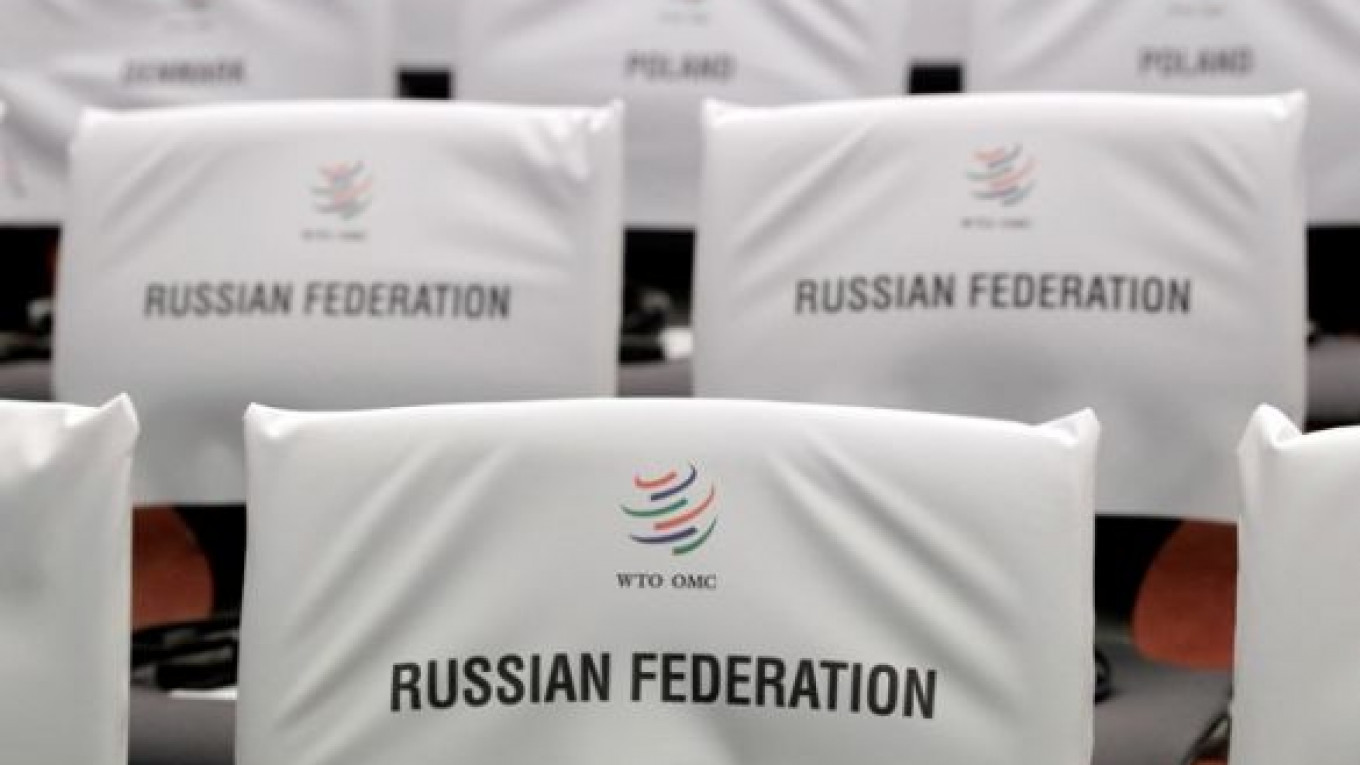Russia’s 19-year wait to enter the World Trade Organization is finally over. Unfortunately, the kind of export and investment miracle enjoyed by China after it joined the club is likely to remain well out of its Eurasian neighbor’s reach.
China too waited 15 years on the WTO’s doorstep. But for Beijing, joining in 2001 set the stage for a decade that quintupled its exports and propelled its economy from sixth place globally to the world’s second-biggest.
Russia’s commodity-based economy is less well-placed to enjoy that kind of spurt. And with trade and investment flows both scarcer than they were a decade ago, it will struggle to attract investments on a similar scale to China.
There are plenty of positives, however.
Foreign tariff barriers are estimated to cost exporters $1.5 billion to $2 billion a year. The WTO confers lower trade barriers and equal treatment for all members.
Moscow will have to haul up its own barriers, with average tariffs set to fall by a third. Tariffs on foreign cars, for instance, are to halve by 2019. So cheaper imports should leave consumers and companies with more money to spend.
And while parts of some uncompetitive sectors could sink — the domestic auto industry is a much-cited example — others, such as banking and telecom, will be opened to foreign investment.
Furthermore, the country is hobbled by a reputation for crony capitalism, red tape and disregard for investors’ rights. Optimists hope WTO entry, which has the blessing of President Vladimir Putin and is bound by strict previously approved timetables, will instill a sense of urgency in the Kremlin’s half-hearted reform efforts.
Ed Conroy, a fund manager at HSBC Global Asset Management, reckons Russia, like most new WTO entrants, will enjoy a growth and investment pickup if it dismantles protectionist barriers and finally shows a clear commitment to free-market policies.
“WTO is not a magic wand they can wave to create an investment haven, but if you create a less restrictive framework, you automatically create opportunities. Don’t expect a revolution but an evolution towards a more open, competitive economy,” Conroy said.
Conroy is betting bank shares will be prime beneficiaries in post-WTO Russia. Others, such as Chris Weafer at Moscow brokerage Troika Dialog, advise loading up on shares in some retailers and airlines that stand to gain from lower import tariffs.
This is in line with the view of the World Bank, which has calculated the short-term value of WTO membership to Russia at $49 billion a year, or more than 3 percent of gross domestic product at 2010 prices. That would rise to $162 billion annually when the longer-term impact on the investment climate is factored in.
But this does not spell a China-like growth miracle.
A vast pool of cheap labor handed China a post-WTO bonanza, with goods exports rising more than 20 percent a year. Foreign direct investment inflows surged five-fold over the decade thanks to foreign companies setting up factories.
That won’t happen in Russia. For one, its exports are dominated by oil and gas, which are not subject to tariff barriers. Second, the manufacturing-for-export model is unlikely to take off because of relatively high labor costs and a domestic workforce limited by years of stagnant population growth.
The United Nations Conference on Trade and Development has also admitted that WTO accession may not have substantial investment generating effects for manufacturing.
WTO Director General Pascal Lamy is not expecting too much for Russia immediately.
“I think China-2001 and Russia-2012 are not really comparable,” he told Reuters Insider, citing the different export structures of the two countries and also the fact that Moscow had negotiated for a gradual phased-in opening up of trade.
“This is not a big bang accession,” he added.
Crucially, Russia will suffer from the difference in the world economy that has occurred since China’s 2001 entry. Back then, the global economy stood on the cusp of a trade boom fueled by surging housing and credit markets.
“What China benefited from was that for many years you had a period of debt-driven growth in the West,” said John-Paul Smith, head of emerging equity strategy at Deutsche Bank.
Related articles:
A Message from The Moscow Times:
Dear readers,
We are facing unprecedented challenges. Russia's Prosecutor General's Office has designated The Moscow Times as an "undesirable" organization, criminalizing our work and putting our staff at risk of prosecution. This follows our earlier unjust labeling as a "foreign agent."
These actions are direct attempts to silence independent journalism in Russia. The authorities claim our work "discredits the decisions of the Russian leadership." We see things differently: we strive to provide accurate, unbiased reporting on Russia.
We, the journalists of The Moscow Times, refuse to be silenced. But to continue our work, we need your help.
Your support, no matter how small, makes a world of difference. If you can, please support us monthly starting from just $2. It's quick to set up, and every contribution makes a significant impact.
By supporting The Moscow Times, you're defending open, independent journalism in the face of repression. Thank you for standing with us.
Remind me later.


